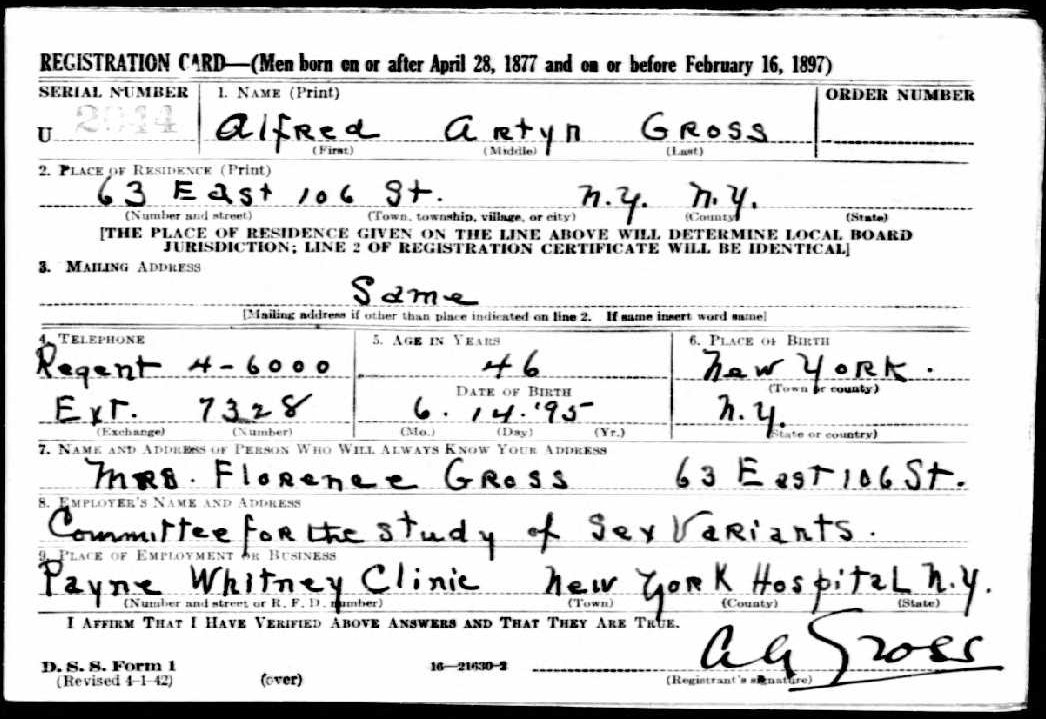
Dr. Alfred A. Gross
Biography
Alfred A. Gross was born on June 14, 1895 in New York City to Samuel and Florence (nee Abrahams) Gross. They settled into the long-time family home at 63 E. 106th Street in Manhattan in 1900. He received educational degrees from Amherst College (1915), Yale Divinity School (1917) and Oxford and received a doctorate in philosophy from the University of Edinburgh in 1921.
It has been reported, but not independently verified, that Gross was ordained as an Anglican priest and then dismissed as a priest around 1937, presumably for homosexual activities. At this time he sought out Dr. George W. Henry in New York who had a reputation as a psychiatric specialist in homosexuality. Henry was impressed with Gross's educational background and acumen and invited him to assist with research with homosexuals and sex offenders. This began a collaboration that lasted for several decades.
Gross became a staff member of the Committee for the Study of Sex Variants in 1938. In his first project Gross interviewed and collected data from one hundred homosexual offenders and lower-class homosexual men in New York City. Gross wrote an article based upon this research which was published under Henry's name. This pattern of collaboration--Gross gathering the data and writing the report under the auspices of the reputable Dr. Henry--proved to be mutually beneficial in their ongoing work together.
With the onset of World War II, Dr. Henry was engaged by the Selective Service System as one of the psychiatric consultants who screened men suspected of homosexuality. Henry delegated most of this work to Gross who worked out of the Payne Whitney Psychiatric Clinic at the New York Hospital. Gross ended up screening over 2,000 men, most of whom were disqualified from military service. It is conjectured that Gross offered to arrange for gay men in his social networks to be excused from military service. Also during this time, Gross was accused of "fraternization" with some of the men he interviewed. This behavior pattern of sexual involvement with clients and research subjects reappears throughout Gross's career.
 World War II registration card
World War II registration card
After the War, Henry and Gross were approached by a group of Quakers to assist them in helping young men arrested on the charge of homosexuality. In early 1946, the Civil Readjustment Committee of the Quaker Emergency Service was established. Gross was executive secretary of the committee and carried out most of its work with arrested homosexuals who were placed on probation in New York City. Gross developed a network of clergy and physicians to provide support services for these men--mostly lower-class gay men--to help them learn to refrain from sexual activity in public settings, thereby helping them fit into society.
The Quaker Committee severed its relationship with Henry and Gross in early 1948, after a sensationalist article about their work appeared in Collier's magazine that led to a public dispute between Gross and the author and, once again, charges that Gross was inappropriately involved with clients.
Henry and Gross then created the George W. Henry Foundation to provide an opportunity for Gross to continue working as a social worker to assist gay men in legal difficulties. It began operation in April 1948 in an office in the University Settlement House on the Lower East Side of Manhattan. The board of directors included liberal Episcopalian clergy as well as other notable doctors and social leaders of the time. Gross was the executive secretary and Henry the psychiatrist-in-chief. The major source of its cases was court referrals of men put on probation, but also included referrals by social service agencies and clergy. As the Foundation's reputation grew, it also attracted homosexual persons who came seeking psychotherapy or religious counseling.
Through the work of the Foundation, Gross wrote an annual report as well as articles about homosexuality that appeared in scholarly, religious and popular magazines and journals, usually under Henry's name. Gross also became a speaker and educator on homosexuality, often to clergy gatherings and seminarians. While Gross espoused efforts to cease legal and social discrimination against homosexuals, he resisted involvement with the homophile groups that emerged in the early 1950s and often was at odds with them. Gross's basic approach continued to be to help homosexuals conform to societal norms and thereby to avoid legal and social problems.
In 1962, Gross wrote Strangers in Our Midst: Problems of the Homosexual in American Society that was published by Public Affairs Press in Washington, D.C., with a foreword by the Episcopal Bishop C. Kilmer Myers.
Henry died in 1964 and the Foundation was reorganized with Gross as executive director. Dr. Ruth P. Berkeley, a former student of Henry's, became the psychiatrist-in-chief. Interestingly, some representatives of homophile organizations were included on the board of directors for the first time. In 1965, a chapter of the Foundation was developed in Hartford, Connecticut, through a local council of churches spearheaded by Canon Clinton R. Jones. Still the financial resources of the Foundation continued to be very limited, mostly provided through Episcopal sources and a few other individual benefactors. The Foundation's office was at the Episcopal Church of the Holy Communion, 20th Street at 6th Avenue.
Gross continued to diligently provide support services to many homosexual persons through the work of the Foundation. He suffered a heart attack in 1969 and resigned as executive director in 1972. In his final years he was primarily cared for by Ruth Berkeley, living in the basement of her home. Gross died in 1987 at the age of ninety-one.
(This biographical sketch written by Mark Bowman from information provided in Departing From Deviance: A History of Homosexual Rights and Emancipatory Science in America, by Henry L. Minton, University of Chicago Press, 2002, and The New York Times obituary, dated June 2, 1987.)
Biography Date: February 2007, rev. October
Additional Resources
Profiles:
Tags
Episcopal Church | Jones, Clinton | George W. Henry Foundation | Quaker Emergency Services | Author/editor | U.S. Military | Gross, Alfred
Citation
“Dr. Alfred A. Gross | Profile”, LGBTQ Religious Archives Network, accessed February 16, 2026, https://lgbtqreligiousarchives.org/profiles/alfred-a-gross.
Remembrances